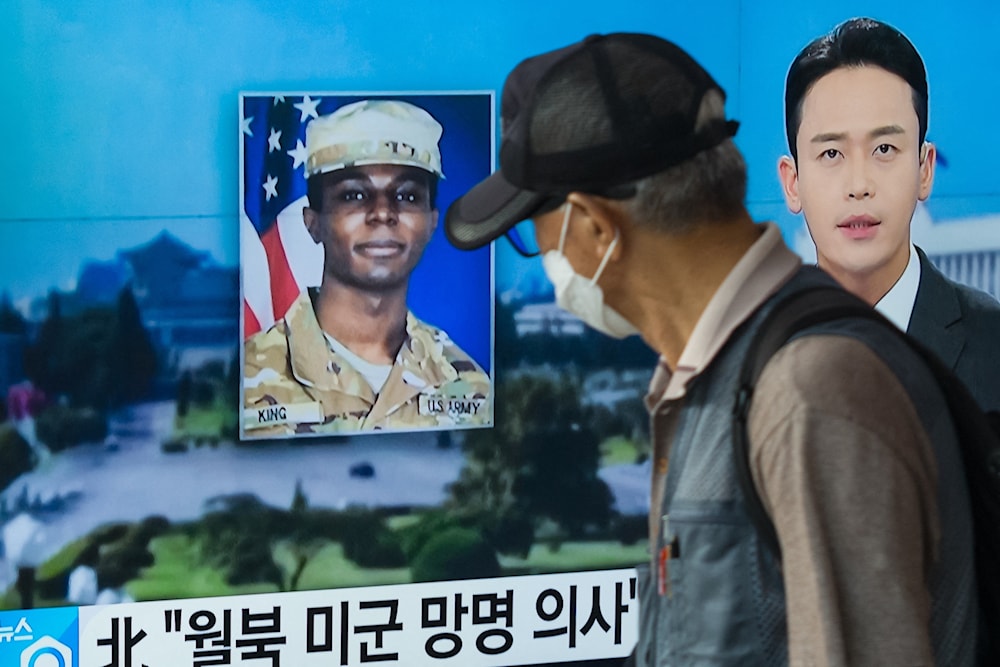US soldier who fled to DPRK to admit guilt in desertion case
Private Second Class Travis King's lawyer Frank Rosenblatt says the US Army had charged his client with 14 offenses, and he will plead guilty to five of them.
-

In this photo taken in Seoul on August 16, 2023, a man walks past a television showing a news broadcast featuring a photo of US soldier Travis King. (AFP)
A US soldier who fled to the Democratic People's Republic of Korea (DPRK) last year will admit to desertion in a court martial as part of a plea agreement, his lawyer confirmed.
Private Second Class Travis King crossed the border from South Korea into the DPRK in July during a sightseeing tour of the Demilitarized Zone that divides the Korean Peninsula.
The DPRK expelled King in September, and the US Army subsequently charged him with desertion and several other crimes.
On Monday, King's lawyer Frank Rosenblatt revealed that the US Army had charged his client with 14 offenses, and he will plead guilty to five of them.
"He will plead guilty to five of those, including desertion, 3 counts of disobeying an officer, and assault on a noncommissioned officer," Rosenblatt stated.
"He will plead not guilty to the remaining offenses, which the Army will withdraw and dismiss," he added.
According to the lawyer, King's guilty plea and sentencing hearing are scheduled for September 20 at a court martial in Fort Bliss, Texas.
"There, he will explain what he did, answer a military judge's questions about why he is pleading guilty, and be sentenced," Rosenblatt said.
It is worth noting that desertion can result in a prison sentence of up to five years.
"Travis is grateful to his friends and family who have supported him, and to all those outside of his circle who did not pre-judge his case based on the initial allegations," his lawyer said.
Dive deeper
At the time of the incident, King was stationed in South Korea. Following a drunken bar fight and a stint in a South Korean jail, he was scheduled to return to Texas for disciplinary hearings.
The #US Army has identified the soldier who crossed the demarcation line into #NorthKorea as Private (#Pvt) #TravisKing on Tuesday.
— Al Mayadeen English (@MayadeenEnglish) July 20, 2023
Here's what you need to know about the issue so far. pic.twitter.com/NxIQ2aJjnu
Instead of traveling to Fort Bliss, he left the Seoul-area airport, joined a DMZ sightseeing tour, and crossed the heavily fortified border, where he was subsequently detained by DPRK authorities.
Pyongyang had stated that King defected to DPRK to avoid "mistreatment and racial discrimination in the US Army."
However, after conducting its investigation, the DPRK chose to expel King in September for illegally entering its territory.
Previous defections
The last American to have crossed over to the DPRK was Bruce Byron Lowrance, who crossed over from China to the DPRK in October 2018. Lowrance was accused of working for the CIA but was released a month after being taken into custody, with the mediation of the Swedish Embassy in the DPRK.
Another case of an American being held in DPRK is that of Otto Warmbier, a US college student who went to the DPRK as a tourist back in 2016 and his 5-day stay became a year and a half's worth of detention after he was caught stealing in his hotel.
Although he was sentenced to 15 years of hard labor, and was later released to US officials in 2017, Warmbier's physical health was in poor condition, and died less than a week after returning to the US.
The most famous case of a US soldier crossing over was that of US Army sergeant Charles Jenkins who crossed in 1965 while stationed at a US military unit near the demilitarized zone. During his stay in the DPRK, he appeared in films, taught spies English, and studied the writings of DPRK leaders almost eight hours a day. King later left the DPRK in 2004.

 4 Min Read
4 Min Read








